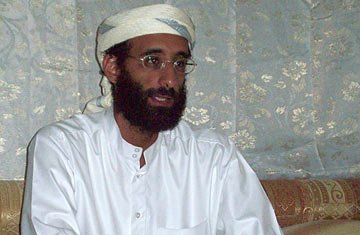
Imam Anwar al-Awlaki in Yemen, October 2008
U.S. officials are awaiting confirmation that a Yemeni air strike killed Anwar al-Awlaki, the radical American cleric who exchanged email messages with the alleged Fort Hood Shooter, Maj. Nidal Hasan. Counterterrorism officials and experts have differing views on Awlaki's importance to the wider jihadist cause. "The death of Awlaki would deprive al-Qaeda of a prominent face, a prominent voice, and someone who'd gotten involved in operations," says one counterterrorism official, who asked not to be named because he is not authorized to discuss the air strike with the media.
But Peter Bergen, an Al-Qaeda expert at the New American Foundation, says Awlaki was merely "important as an inciter to jihad, no more." Bruce Hoffman, a terrorism expert at Georgetown University says it's unlikely Awlaki would have beeen involved in operational activities. "He was a cleric, not a field commander," he says.
Whatever his position in the Al Qaeda hierarchy, Awlaki had emerged as a major headache for U.S. officials. American-born and educated, he had contact with at least two 9/11 hijackers before fleeing the US in late 2001. In Yemen, he became something of an e-imam, using the internet to preach fiery anti-American and anti-West sermons. He called upon believers to rise up against the U.S. Because his sermons were published in English, he became popular with radical American Muslims. "He understood American society and was able to tailor his message to American audiences," says Hoffman.
Hasan, accused of killing 13 people at Fort Hood, reached out to Awlaki a year ago. Although Awlaki denies encouraging Hasan to kill, the cleric praised the major on his website as a "hero" after the shootings, and exhorted other Muslims in the U.S. military to follow his example.
Initial reports that the airstrike may have been the work of the CIA seem to have been mistaken: Yemeni authorities say it was their jets that conducted the dawn operation, in the province of Shabwa, 400 miles south of the capital Sana'a. In a statement, the Yemeni embassy in Washington D.C. said the strike targeted a meeting of "scores of Yemeni and foreign Al Qaeda operatives." The meeting had been called to discuss retaliation for government raids in mid-December on al-Qaeda hideouts in Abyan and Sana'a provinces.
Around 30 people are reported to have beeen killed in the strike, among them, Nasser Al-Wuhayshi, the regional al-Qaeda leader and his deputy, Saeed Al-Shihri, a former Gitmo detainee. Shihri was repatriated in 2007 to Saudi Arabia, where he was enrolled in a rehabilitation program for hardcore jihadists. Shortly after his release, however, he returned to the al-Qaeda fold in Yemen.
